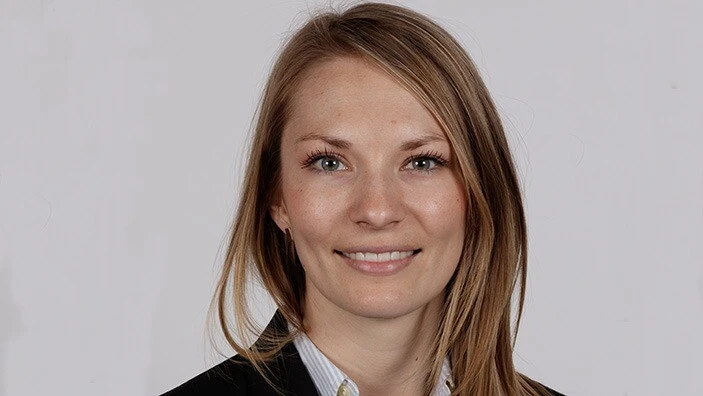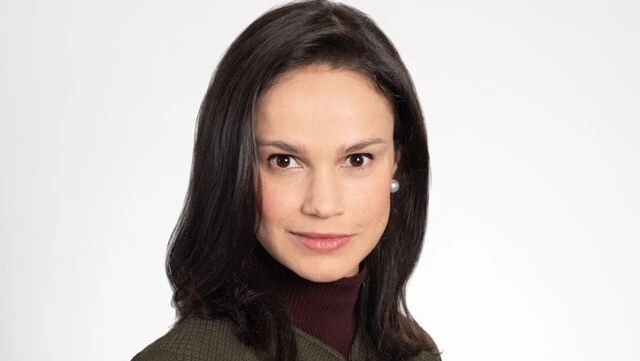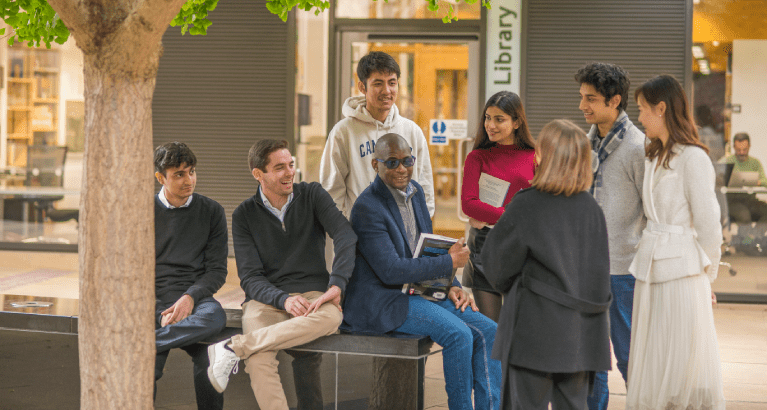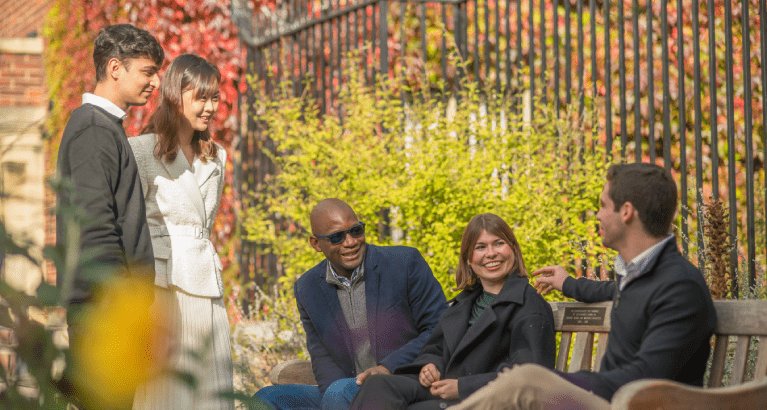From pledging net-zero carbon emissions to building diverse, sustainable workforces, companies are putting an ever-growing emphasis on ESG – and with the UN Climate Change Conference (COP 28) taking place in Dubai this month, all eyes are on the s-word.
In line with this growing emphasis on ESG, the Cambridge Master of Finance offers core and elective courses in areas including the Circular Economy and Sustainable Finance, as well as practical opportunities, sessions from industry speakers and plenty more – giving students a chance to get ahead of the curve in all things sustainability, while solidifying their financial knowledge as a whole.
That knowledge is becoming increasingly important for recruiters, according to Elroy Dimson, Professor of Finance at the Business School. “There’s been an extraordinary increase in recruiters’ and students’ focus on responsible investing,” he says. “It’s no longer a case of ESG expertise providing a positive edge to students who are seeking a career in finance. Job candidates need to be comfortable integrating an awareness of these issues in all they do.”
There’s been an extraordinary increase in recruiters’ and students’ focus on responsible investing. It’s no longer a case of ESG expertise providing a positive edge to students who are seeking a career in finance. Job candidates need to be comfortable integrating an awareness of these issues in all they do.
So how can the MFin help propel a career in ESG and sustainable finance, what’s it like to work in the field, and what are the key opportunities to look out for? We spoke to 2 Cambridge Judge alumni to find out.
Jesica Andrews, Head of Climate Accountability at the United Nations (UN)

(MFin 2018)
What does your work at the UN involve?
I work with some of the world’s largest institutional investors and banks on transitioning their portfolios and loan-books to become carbon neutral by 2050. Having committed to help support the financing of a net-zero economy, their investments have to change across every single sector.
This also involves working on policy messaging, since investors need to have clear guidance from governments on their industrial plans, net-zero targets and any related taxing schemes.
What’s your background and how did the MFin help progress your career?
I’ve worked with the UN on climate change for over 10 years, and midway through I decided to pursue the MFin. During the programme, I’d looked at things like how to incorporate green elements into equity research. As I was finishing the MFin, work around examining climate-related risks was just emerging in the private finance sphere.
Working with investors on climate-related risks caught on more than I could have imagined, and since then, financial sector commitments to net zero have skyrocketed. Together with policy makers, we’ve seen a growing discussion between the public and private sectors around how to support the transition to a net-zero economy.
How were ESG and sustainable finance explored on the MFin?
I was able to tap into deep discussions with my professors, and I benefited from Simon Taylor’s research on nuclear energy costing, as well as Chris Hope’s work on the social cost of climate change. The Group Consulting Project (GCP) allowed us to explore topics of interest and I ended up generating 2 that explored sustainable finance issues.
I was also able to work with the Cambridge Institute for Sustainability Leadership on sustainable finance reports that looked at regulation in 2 key countries. Immediately after the programme, I took up a temporary role with S&P Global’s Sustainable Finance team after they identified me in the MFin student profile book.
What advice do you have for others interested in working in the field?
I always tell anyone interested in working on climate or sustainability that this is the job that every industry is working on, with a lot of hiring taking place. It’s a fast-growing field and there’s a need to help invent new approaches and solutions, so a solid understanding of environmental matters and policy are also extremely useful.
There’s a big focus on climate change, and specific issues like water waste are growing in importance. Jobs with a social issues focus are also rapidly emerging. There are lots of opportunities, and the MFin provides a great stepping stone.
There are lots of opportunities, and the MFin provides a great stepping stone.
Vanessa Gomes, Executive Director, Sustainable Finance Lead for the Americas at Standard Chartered Bank
What does your current role involve?

(MFin in 2012)
My role involves managing and growing the sustainable finance business in the Americas at Standard Chartered Bank. Our goal is to support clients in their net-zero and sustainability journeys, underpinned by our sustainable and transition finance products and our ESG advisory platform.
To achieve this, I collaborate with different teams to originate, advise, monitor and execute sustainable finance solutions for clients in the Americas. These include green, social and sustainability loans, as well as sustainability-linked financing products, in addition to guiding clients on their sustainability positioning.
How would you define ESG and how important are these considerations in the finance industry today?
The ESG framework encompasses various sustainability factors. For environmental, the most common factors are climate change mitigation and adaptation, water, waste management and biodiversity. Social sustainability factors include safety management, workforce and diversity, human rights and customer engagement, while governance includes code and values, structure and transparency.
These factors can have a material impact on the business, which could be positive or negative depending on the industry and positioning. Investors are increasingly using this framework to make well-informed decisions about the sustainability risks and opportunities for a given organisation or project. They want to know how institutions are mitigating those risks and seizing the opportunities.
How did you get to your current position and how did the MFin help?
I studied on the MFin at Cambridge Judge Business School in 2011-12. This gave me a strong financial foundation and the credentials to build my profile and career. I transitioned into sustainable finance in around 2018, after several years in corporate finance and banking, capitalising on the skills from that experience to serve the sustainability angle.
I started by mentoring founders of sustainability start-ups that were part of a Corporate Sustainability Accelerator programme, and then began working more directly on several sustainability projects at the organisation I was working for. I also took extra courses and gained certification within the sustainability field. My goal was to focus on the financial materiality of sustainability – job opportunities followed naturally, as this is a growing area.
What tips do you have for current and potential students looking to pursue a career in sustainable finance?
There are many opportunities out there in sustainability – but even if you can’t find a specific sustainability or sustainable finance role, I would recommend joining a company that has made significant commitments towards sustainability and net-zero targets.
By doing so, you’ll get involved in the organisation’s journey towards to achieving those goals, which is a transformative process for the company. This path requires the participation of all employees to engage and contribute to the effort.
There are many opportunities out there in sustainability – but even if you can’t find a specific sustainability or sustainable finance role, I would recommend joining a company that has made significant commitments towards sustainability and net-zero targets.
4 ways ESG is embedded on the Cambridge MFin
1. Core and elective courses
Core courses on the MFin address key ESG issues, including Management, Leadership and Ethics.
The Financial Institutions and Markets course includes a section on the interaction between climate change and the financial system, while electives give students the chance to home in on certain areas – from Sustainable Finance and the Circular Economy to the Purpose of Finance.
2. Group Consulting Project
The Group Consulting Project (GCP) gives students the opportunity to work on a real-life project with an external client – often on topics related to sustainability.
“These often involve some aspect of ESG,” says Simon Taylor, Management Practice Professor of Finance and Director of the Global Executive MBA. “Students are free to source their own GCP if they want to focus on a specific topic within ESG. The students get to put their classroom knowledge to practical use and see how that topic fits into a wider commercial or institutional context.”
3. Speakers
The City Speaker Series features informative, inspiring talks from finance professionals across different topics.
“We usually have at least one City Speaker during the year who will talk about some practical aspect of ESG investing,” says Taylor. “This provides students with practical financial expertise and a chance to network with those in the industry.”
4. Research centres
The Business School is home to several research centres, including the Circular Economy Centre.
Cambridge Judge Business School students have the opportunity to work with academic faculty and industry partners on research projects in collaboration with the centre – as well as departments from across the wider University of Cambridge, such as the Cambridge Institute of Sustainability Leadership.






